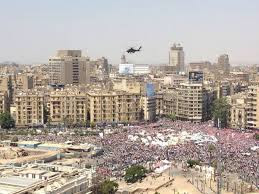On Sunday, Egypt's opposition movements are planning on holding major demonstrations against the Muslim Brotherhood-led government. An activist movement, Tamarod, Arabic for "rebellion," claims to have collected 15 million signatures demanding Morsi step down. The expected major demonstrations have been prefaced by a sort of mass panic. People here see 30 June, the date of the demonstrations and the year anniversary of Morsi's ascendance to power, as the last hope to save Egypt. The ruling party and its allies have done little to quell fears of violence, saying in one breath it would be open to negotiations and in another calling the opposition "kufirs," or "disbelievers," and vowing to meet violence with violence.
Perhaps more worrying, the opposition itself seems to be bent on violence. Without massive violence, they rightly surmise, there will be no political change. Only with massive violence will the army be forced to step in and take out the Morsi government--this, to many, is the optimal result.
I had a conversation today where I was asked if I was optimistic about 30 June. What does it mean to be optimistic, I asked. Would I be optimistic to hope for little violence--which would mean Egypt's politics stay the same--or optimistic to hope for violence and an overthrow of the government.
I, for the most part, expect a repeat of the
clashes in December after Morsi's power-grabbing presidential decree. I honestly cannot picture Egypt descending into chaos--I use this as a relative term, of course. Many think it's already chaotic, although I think it's at an uneasy balanced point. Everything is constantly in flux, and yet nothing ever changes. It'll be ungodly hot, the opposition is divided, and thus far the Muslim Brotherhood says it will not go down on 30 June. They have so far allowed these protests to go on and let them die out--perhaps the smartest course of action in terms of international attention. The Muslim Brotherhood can point to the demonstrations and say there is increased freedoms, and the demonstrations eventual peter out.
Whatever happens, there is only a week for the change as Ramadan soon starts. No one will go down when they're hungry, tired, and hot (which I, selfishly, am thankful for, as my mom is scheduled to be in town).
But there are many expecting mass violence, blood in the streets. It's an existential crisis on both sides. The opposition sees the Morsi government and the Muslim Brotherhood in general as just as bad, probably worse, than Mubarak. They are utilizing religion to steal power, and the opposition wants nothing less than to overthrow the government.
The Muslim Brotherhood, however, is unlikely to give up power, as they too rightly surmise that negotiating, that stepping down would mean prison in the best case, death in the worst. Last month, a senior Muslim Brotherhood member's
son was beaten to death in a small town in the Sharquia governate. The murder was in retribution for the son's alleged shooting of an opposition activist over a Facebook post critical about his father. Opposition also openly call for the assassination of the president and killing of his supporters, neither of which are conducive to negotiations.
All anyone here can talk about is what they think will happen. Most people expect massive violence. Our office is closed on 30 June and people are being told to stock up on food, water, and money with the expectation of empty ATMs. There are huge queues at the petrol station, caused partly by a disel and gas shortage, partly because people are panicking and trying to get as much gas as they can. My boss, worried about a crazy young female foreigner, is trying to get me to leave town.
Anger is boiling at the United States, which is perceived to have stood behind the Morsi government. On the one hand people say the United States has not come out forcefully enough for its values and against the government, and on the other hand say the United States has been too supportive of the Muslim Brotherhood and unwilling to stand up for its values and beliefs. In other words, the United States is at once perceived as doing too little and too much meddling. I am up to my eyeballs in anti-US sentiment, although I am yet to give up on trying to explain the United States' complicated stance.
People have said this all before, however, and nothing has come of the demonstrations. People have gone down, said their spiel, and gone home. Demonstrations were followed by isolated clashes at night, but life went on semi-normally.





.jpg)


.jpg)





